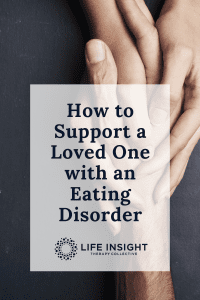How to Support a Loved One with an Eating Disorder
Supporting a loved one with an eating disorder can be extremely tricky. You may feel like you are walking on eggshells, trying to determine what is okay or not to say and do. You may not yet have a good understanding of what an eating disorder really is, but the fact that you want to be supportive means you are headed in the right direction. Here are a few steps you can do to really help the recovery process…and things that may be well-intended but end up hurting instead.
WHAT HURTS:
- Food talk. Feelings of guilt in relation to food can worsen by hearing others at meals say, “This is so fattening” or “This tastes terrible, it makes me want to vomit.” Socializing at meals can be a great help in the recovery process, but only when the conversation is more positive.
- Invalidating statements. Saying to someone with an eating disorder, “But you look fine. You don’t look like you have an eating disorder” or “Why can’t you just eat?” makes your loved one feel like his or her whole struggle is being tossed aside or not taken seriously. Eating disorders affect people of all weights and shapes and the struggle is full of self-hatred, guilt, shame, and self-consciousness. There is no room for judgment in the recovery process.
- Poor timing. Addressing eating disorder-related behaviors or concerns with your loved one can be very productive, but there is a time and place for these conversations. Avoid confronting your loved one in the middle of a meal, especially if other people are present or if you are in a public place. Find a time when everyone is more likely to have open communication and defenses are low.
- Making assumptions. The absolute best way to interact with your loved one and gain perspective is by simply asking questions. Operating based on assumptions or observations can lead to miscommunications and make matters worse. Starting a conversation with “You aren’t eating again” is much more accusatory than starting one with “How are you feeling today? Is there anything you’re struggling with?”
- Adding to someone’s guilt. Guilt is a very common emotion associated with eating disorders. Without meaning to do so, you may make this guilt worse, particularly by taking eating disorder-related things personally. For example, if your loved one struggles to finish a meal that you worked hard to cook, placing blame on that person or making that person feel bad only adds on to pre-existing negative feelings.
WHAT HELPS:
- Do your homework. This shows your loved one that you care enough to take time out of your day to gather more information in order to better understand that person. Simply searching the internet for more information about eating disorders can provide insight and perspective that will be valuable to you and your relationship with your loved one.
- A nonjudgmental attitude. Eating disorders involve some level of fear that others are constantly creating judgments, and efforts to disprove those judgments or negative thoughts that confirm those judgments. Assure your loved one that he or she can approach you no matter what, without fear of being judged or criticized.
- Compliments about personality instead of appearance. Many people with an eating disorder struggle to take compliments. But when those compliments revolve around someone’s intelligence, compassion, or humor instead of their weight, fitness level or jeans size, it reminds your loved one that his or her appearance does not determine self-worth.
- Relentless positivity. Being positive about your own body and health sets a wonderful example for your loved one. Make an effort to practice self-care in your own life and reframe any negative thoughts or statements that you may have about yourself (example: you can change “I hate that I’ve gained weight” to “My body has changed recently, but I’m doing my very best to take care of myself”).
- Acknowledge baby steps of progress. Eating disorder recovery is essentially a series of challenges that each person will accomplish in his or her own time. If your loved one is not ready to take on a certain challenge just yet, accept this and offer recognition of other accomplishments, no matter how small.
No two people recovering from an eating disorder are exactly the same, but no matter what, every person needs love and support. Your loved one may approach you with different ideas or ways to offer support; be as receptive as possible to these discussions. Rest assured that your efforts are appreciated, and your support can play a crucial role in someone’s recovery.

Join Our Community.
Sign up for our quarterly newsletter with practice news, timely resources, staff highlights, and other helpful tidbits!
Recent Posts






